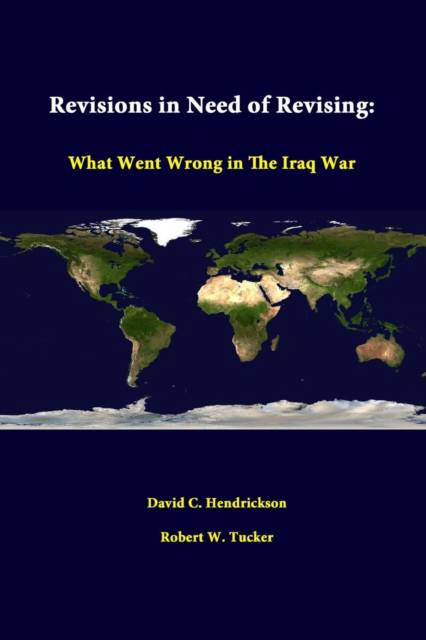
- Afhalen na 1 uur in een winkel met voorraad
- Gratis thuislevering in België vanaf € 30
- Ruim aanbod met 7 miljoen producten
- Afhalen na 1 uur in een winkel met voorraad
- Gratis thuislevering in België vanaf € 30
- Ruim aanbod met 7 miljoen producten
Zoeken
Revisions In Need Of Revising
What Went Wrong In The Iraq War
David C Hendrickson, Robert W Tucker, Strategic Studies Institute
Paperback | Engels
€ 20,45
+ 40 punten
Omschrijving
David C. Hendrickson and Robert W. Tucker examine the contentious debate over the Iraq war and occupation, focusing on the critique that the Bush administration squandered an historic opportunity to reconstruct the Iraqi state because of various critical blunders in planning. Though they conclude that critics have made a number of telling points against the Bush administration's conduct of the Iraq war, they argue that the most serious problems facing Iraq and its American occupiers-criminal anarchy and lawlessness, a raging insurgency, and a society divided into rival and antagonistic groups-were virtually inevitable consequences that flowed from the act of war itself. Military and civilian planners were culpable in failing to plan for certain tasks, but the most serious problems had no good solution. The authors draw attention to a variety of lessons, including the danger that the imperatives of "force protection" may sacrifice the broader political mission of U.S. forces...
Specificaties
Betrokkenen
- Auteur(s):
- Uitgeverij:
Inhoud
- Aantal bladzijden:
- 46
- Taal:
- Engels
Eigenschappen
- Productcode (EAN):
- 9781312322486
- Verschijningsdatum:
- 1/07/2014
- Uitvoering:
- Paperback
- Formaat:
- Trade paperback (VS)
- Afmetingen:
- 152 mm x 229 mm
- Gewicht:
- 81 g

Alleen bij Standaard Boekhandel
+ 40 punten op je klantenkaart van Standaard Boekhandel
Beoordelingen
We publiceren alleen reviews die voldoen aan de voorwaarden voor reviews. Bekijk onze voorwaarden voor reviews.











